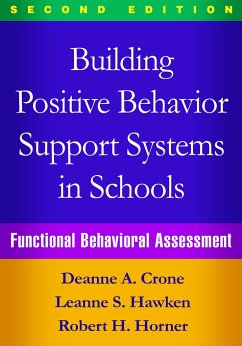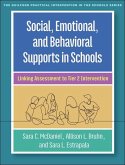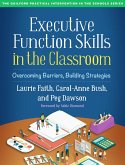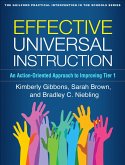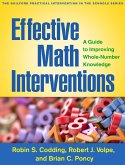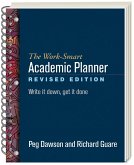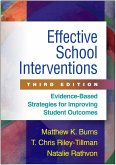Deanne A. Crone (United States University of Oregon), Leanne S. Hawken (United States University of Utah), Robert H. Horner (United States University of Oregon)
Building Positive Behavior Support Systems in Schools
Functional Behavioral Assessment
Deanne A. Crone (United States University of Oregon), Leanne S. Hawken (United States University of Utah), Robert H. Horner (United States University of Oregon)
Building Positive Behavior Support Systems in Schools
Functional Behavioral Assessment
- Broschiertes Buch
- Merkliste
- Auf die Merkliste
- Bewerten Bewerten
- Teilen
- Produkt teilen
- Produkterinnerung
- Produkterinnerung
A widely used practitioner guide and text, this book presents a blueprint for meeting the challenges of severe problem behavior in grades PreK-8. It shows how to provide effective behavior support for the 1-5% of students who require intensive, individualized intervention.
Andere Kunden interessierten sich auch für
![Social, Emotional, and Behavioral Supports in Schools Social, Emotional, and Behavioral Supports in Schools]() Sara C. McDanielSocial, Emotional, and Behavioral Supports in Schools45,99 €
Sara C. McDanielSocial, Emotional, and Behavioral Supports in Schools45,99 €![Effective Bullying Prevention Effective Bullying Prevention]() Adam Collins (United States Colorado Department of Education)Effective Bullying Prevention48,99 €
Adam Collins (United States Colorado Department of Education)Effective Bullying Prevention48,99 €![Executive Function Skills in the Classroom Executive Function Skills in the Classroom]() Laurie Faith (Canada" "University of Toronto)Executive Function Skills in the Classroom48,99 €
Laurie Faith (Canada" "University of Toronto)Executive Function Skills in the Classroom48,99 €![Effective Universal Instruction Effective Universal Instruction]() Kimberly Gibbons (United States University of Minnesota)Effective Universal Instruction48,99 €
Kimberly Gibbons (United States University of Minnesota)Effective Universal Instruction48,99 €![Effective Math Interventions Effective Math Interventions]() Robin S. Codding (United States University of Minnesota)Effective Math Interventions52,99 €
Robin S. Codding (United States University of Minnesota)Effective Math Interventions52,99 €![The Work-Smart Academic Planner The Work-Smart Academic Planner]() Peg DawsonThe Work-Smart Academic Planner27,99 €
Peg DawsonThe Work-Smart Academic Planner27,99 €![Effective School Interventions Effective School Interventions]() Natalie RathvonEffective School Interventions57,99 €
Natalie RathvonEffective School Interventions57,99 €-
-
-
A widely used practitioner guide and text, this book presents a blueprint for meeting the challenges of severe problem behavior in grades PreK-8. It shows how to provide effective behavior support for the 1-5% of students who require intensive, individualized intervention.
Produktdetails
- Produktdetails
- Verlag: Guilford Publications
- 2 ed
- Seitenzahl: 288
- Erscheinungstermin: 18. Februar 2015
- Englisch
- Abmessung: 254mm x 178mm x 15mm
- Gewicht: 542g
- ISBN-13: 9781462519729
- ISBN-10: 1462519725
- Artikelnr.: 41621578
- Herstellerkennzeichnung
- Libri GmbH
- Europaallee 1
- 36244 Bad Hersfeld
- gpsr@libri.de
- Verlag: Guilford Publications
- 2 ed
- Seitenzahl: 288
- Erscheinungstermin: 18. Februar 2015
- Englisch
- Abmessung: 254mm x 178mm x 15mm
- Gewicht: 542g
- ISBN-13: 9781462519729
- ISBN-10: 1462519725
- Artikelnr.: 41621578
- Herstellerkennzeichnung
- Libri GmbH
- Europaallee 1
- 36244 Bad Hersfeld
- gpsr@libri.de
Deanne A. Crone, PhD, is Research Associate at the Center on Teaching and Learning at the University of Oregon. She has directed several research and training grants that address behavior disorders, positive behavior support, and functional behavioral assessment. Dr. Crone has presented her work on function-based support locally, regionally, and nationally, and has conducted workshops with a variety of professionals, including school psychologists, administrators, teachers, and paraprofessionals. With Leanne S. Hawken and Robert H. Horner, she is coauthor of Responding to Problem Behavior in Schools, Second Edition. Leanne S. Hawken, PhD, BCBA, is Professor Emeritus in the Department of Special Education at the University of Utah. Dr. Hawken has 30 years of experience in the fields of psychology, education, positive behavior support (PBIS), and applied behavior analysis (ABA). She has been a PBIS/MTSS district- and school-level coach and has been has been training, coaching, and conducting research on Check-In, Check-Out (CICO) since the early 2000s. Outside the school context, Dr. Hawken is a certified life coach who is passionate about combining the science of ABA with the tactics of life coaching. Robert H. Horner, PhD, is Professor of Special Education at the University of Oregon and Director of Educational Community Supports, a research unit within the College of Education that develops and implements practices resulting in positive, durable, and scientifically validated change in the lives of individuals with disabilities and their families. Dr. Horner's 35-year history of research has focused on applied behavior analysis, stimulus control, instructional technology, positive behavior support, and large-scale system change.
I. Using Functional Behavioral Assessment in Schools: Context and Framework
1. Functional Behavioral Assessment in Schools: Historical Background and
the Current Context, Robert E. O'Neill & Kaitlin Bundock
2. Functional Behavioral Assessment in Schools: Thinking Functionally
across All Tiers of Behavior Support
II. Embedding Functional Behavioral Assessment within School Systems: Case
Examples
3. Conducting a Functional Behavioral Assessment
4. Designing a Behavior Support Plan
5. Evaluating and Modifying the Behavior Support Plan
III. Using Functional Behavioral Assessment within School Systems: Building
School-Based and District-Based Capacity
6. Who Will Be Involved in the Behavior Support Team and How Do You Get the
Behavior Support Team to Work Together as a Team?
7. How Do You Generate within-Building Capacity for Functional Behavior
Assessment on the Behavior Support Team?
8. Improving District Capacity to Deliver Basic FBA-BSP Support, M.
Kathleen Strickland-Cohen, Sheldon L. Loman, & Robert H. Horner
IV. Functional Behavioral Assessment as Applied to Specific Problems or
Specific Populations
9. Functional Behavioral Assessment for Academic Concerns, Courtenay A.
Barrett & Donna M. Gilbertson
10. Functional Behavioral Assessment with Preschool-Age Children
11. Technology Trends in Functional Behavioral Assessment and Intervention,
J. Matt Jameson, Allison L. Bruhn, & Leanne S. Hawken
Appendix A
Request for Assistance Form
Appendix B
Functional Behavioral Assessment-Behavior Support Plan Protocol (F-BSP
Protocol)
Appendix C
Functional Assessment Checklist for Teachers and Staff (FACTS)
Appendix D
Student-Guided Functional Assessment Interview (Primary)
Appendix E
Assessing Activity Routines Form
Appendix F
Brief Functional Assessment Interview Form
Appendix G
Functional Assessment Observation Form
Appendix H
A Checklist for Assessing the Quality of Behavior Support Planning: Does
the Plan (or Planning Process) Have These Features?
1. Functional Behavioral Assessment in Schools: Historical Background and
the Current Context, Robert E. O'Neill & Kaitlin Bundock
2. Functional Behavioral Assessment in Schools: Thinking Functionally
across All Tiers of Behavior Support
II. Embedding Functional Behavioral Assessment within School Systems: Case
Examples
3. Conducting a Functional Behavioral Assessment
4. Designing a Behavior Support Plan
5. Evaluating and Modifying the Behavior Support Plan
III. Using Functional Behavioral Assessment within School Systems: Building
School-Based and District-Based Capacity
6. Who Will Be Involved in the Behavior Support Team and How Do You Get the
Behavior Support Team to Work Together as a Team?
7. How Do You Generate within-Building Capacity for Functional Behavior
Assessment on the Behavior Support Team?
8. Improving District Capacity to Deliver Basic FBA-BSP Support, M.
Kathleen Strickland-Cohen, Sheldon L. Loman, & Robert H. Horner
IV. Functional Behavioral Assessment as Applied to Specific Problems or
Specific Populations
9. Functional Behavioral Assessment for Academic Concerns, Courtenay A.
Barrett & Donna M. Gilbertson
10. Functional Behavioral Assessment with Preschool-Age Children
11. Technology Trends in Functional Behavioral Assessment and Intervention,
J. Matt Jameson, Allison L. Bruhn, & Leanne S. Hawken
Appendix A
Request for Assistance Form
Appendix B
Functional Behavioral Assessment-Behavior Support Plan Protocol (F-BSP
Protocol)
Appendix C
Functional Assessment Checklist for Teachers and Staff (FACTS)
Appendix D
Student-Guided Functional Assessment Interview (Primary)
Appendix E
Assessing Activity Routines Form
Appendix F
Brief Functional Assessment Interview Form
Appendix G
Functional Assessment Observation Form
Appendix H
A Checklist for Assessing the Quality of Behavior Support Planning: Does
the Plan (or Planning Process) Have These Features?
I. Using Functional Behavioral Assessment in Schools: Context and Framework
1. Functional Behavioral Assessment in Schools: Historical Background and
the Current Context, Robert E. O'Neill & Kaitlin Bundock
2. Functional Behavioral Assessment in Schools: Thinking Functionally
across All Tiers of Behavior Support
II. Embedding Functional Behavioral Assessment within School Systems: Case
Examples
3. Conducting a Functional Behavioral Assessment
4. Designing a Behavior Support Plan
5. Evaluating and Modifying the Behavior Support Plan
III. Using Functional Behavioral Assessment within School Systems: Building
School-Based and District-Based Capacity
6. Who Will Be Involved in the Behavior Support Team and How Do You Get the
Behavior Support Team to Work Together as a Team?
7. How Do You Generate within-Building Capacity for Functional Behavior
Assessment on the Behavior Support Team?
8. Improving District Capacity to Deliver Basic FBA-BSP Support, M.
Kathleen Strickland-Cohen, Sheldon L. Loman, & Robert H. Horner
IV. Functional Behavioral Assessment as Applied to Specific Problems or
Specific Populations
9. Functional Behavioral Assessment for Academic Concerns, Courtenay A.
Barrett & Donna M. Gilbertson
10. Functional Behavioral Assessment with Preschool-Age Children
11. Technology Trends in Functional Behavioral Assessment and Intervention,
J. Matt Jameson, Allison L. Bruhn, & Leanne S. Hawken
Appendix A
Request for Assistance Form
Appendix B
Functional Behavioral Assessment-Behavior Support Plan Protocol (F-BSP
Protocol)
Appendix C
Functional Assessment Checklist for Teachers and Staff (FACTS)
Appendix D
Student-Guided Functional Assessment Interview (Primary)
Appendix E
Assessing Activity Routines Form
Appendix F
Brief Functional Assessment Interview Form
Appendix G
Functional Assessment Observation Form
Appendix H
A Checklist for Assessing the Quality of Behavior Support Planning: Does
the Plan (or Planning Process) Have These Features?
1. Functional Behavioral Assessment in Schools: Historical Background and
the Current Context, Robert E. O'Neill & Kaitlin Bundock
2. Functional Behavioral Assessment in Schools: Thinking Functionally
across All Tiers of Behavior Support
II. Embedding Functional Behavioral Assessment within School Systems: Case
Examples
3. Conducting a Functional Behavioral Assessment
4. Designing a Behavior Support Plan
5. Evaluating and Modifying the Behavior Support Plan
III. Using Functional Behavioral Assessment within School Systems: Building
School-Based and District-Based Capacity
6. Who Will Be Involved in the Behavior Support Team and How Do You Get the
Behavior Support Team to Work Together as a Team?
7. How Do You Generate within-Building Capacity for Functional Behavior
Assessment on the Behavior Support Team?
8. Improving District Capacity to Deliver Basic FBA-BSP Support, M.
Kathleen Strickland-Cohen, Sheldon L. Loman, & Robert H. Horner
IV. Functional Behavioral Assessment as Applied to Specific Problems or
Specific Populations
9. Functional Behavioral Assessment for Academic Concerns, Courtenay A.
Barrett & Donna M. Gilbertson
10. Functional Behavioral Assessment with Preschool-Age Children
11. Technology Trends in Functional Behavioral Assessment and Intervention,
J. Matt Jameson, Allison L. Bruhn, & Leanne S. Hawken
Appendix A
Request for Assistance Form
Appendix B
Functional Behavioral Assessment-Behavior Support Plan Protocol (F-BSP
Protocol)
Appendix C
Functional Assessment Checklist for Teachers and Staff (FACTS)
Appendix D
Student-Guided Functional Assessment Interview (Primary)
Appendix E
Assessing Activity Routines Form
Appendix F
Brief Functional Assessment Interview Form
Appendix G
Functional Assessment Observation Form
Appendix H
A Checklist for Assessing the Quality of Behavior Support Planning: Does
the Plan (or Planning Process) Have These Features?

